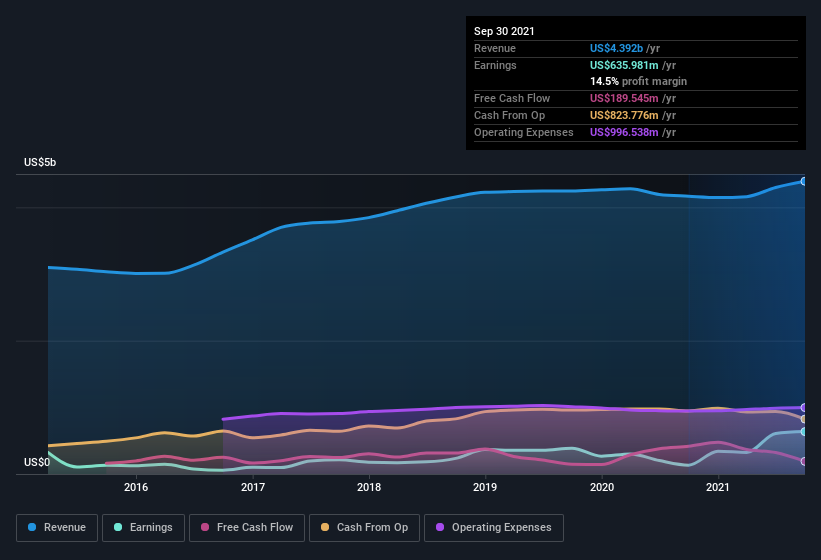I Ran A Stock Scan For Earnings Growth And Iron Mountain (NYSE:IRM) Passed With Ease
Like a puppy chasing its tail, some new investors often chase 'the next big thing', even if that means buying 'story stocks' without revenue, let alone profit. But the reality is that when a company loses money each year, for long enough, its investors will usually take their share of those losses.
In contrast to all that, I prefer to spend time on companies like Iron Mountain (NYSE:IRM), which has not only revenues, but also profits. While profit is not necessarily a social good, it's easy to admire a business that can consistently produce it. In comparison, loss making companies act like a sponge for capital - but unlike such a sponge they do not always produce something when squeezed.
View our latest analysis for Iron Mountain
How Quickly Is Iron Mountain Increasing Earnings Per Share?
If a company can keep growing earnings per share (EPS) long enough, its share price will eventually follow. That means EPS growth is considered a real positive by most successful long-term investors. Who among us would not applaud Iron Mountain's stratospheric annual EPS growth of 38%, compound, over the last three years? Growth that fast may well be fleeting, but like a lotus blooming from a murky pond, it sparks joy for the wary stock pickers.
I like to see top-line growth as an indication that growth is sustainable, and I look for a high earnings before interest and taxation (EBIT) margin to point to a competitive moat (though some companies with low margins also have moats). I note that Iron Mountain's revenue from operations was lower than its revenue in the last twelve months, so that could distort my analysis of its margins. Iron Mountain maintained stable EBIT margins over the last year, all while growing revenue 5.4% to US$4.4b. That's progress.
In the chart below, you can see how the company has grown earnings, and revenue, over time. For finer detail, click on the image.
Fortunately, we've got access to analyst forecasts of Iron Mountain's future profits. You can do your own forecasts without looking, or you can take a peek at what the professionals are predicting.
Are Iron Mountain Insiders Aligned With All Shareholders?
We would not expect to see insiders owning a large percentage of a US$14b company like Iron Mountain. But we are reassured by the fact they have invested in the company. Notably, they have an enormous stake in the company, worth US$118m. I would find that kind of skin in the game quite encouraging, if I owned shares, since it would ensure that the leaders of the company would also experience my success, or failure, with the stock.
Does Iron Mountain Deserve A Spot On Your Watchlist?
Iron Mountain's earnings per share have taken off like a rocket aimed right at the moon. That sort of growth is nothing short of eye-catching, and the large investment held by insiders certainly brightens my view of the company. The hope is, of course, that the strong growth marks a fundamental improvement in the business economics. So to my mind Iron Mountain is worth putting on your watchlist; after all, shareholders do well when the market underestimates fast growing companies. Before you take the next step you should know about the 4 warning signs for Iron Mountain (2 shouldn't be ignored!) that we have uncovered.
Although Iron Mountain certainly looks good to me, I would like it more if insiders were buying up shares. If you like to see insider buying, too, then this free list of growing companies that insiders are buying, could be exactly what you're looking for.
Please note the insider transactions discussed in this article refer to reportable transactions in the relevant jurisdiction.
Have feedback on this article? Concerned about the content? Get in touch with us directly. Alternatively, email editorial-team (at) simplywallst.com.
This article by Simply Wall St is general in nature. We provide commentary based on historical data and analyst forecasts only using an unbiased methodology and our articles are not intended to be financial advice. It does not constitute a recommendation to buy or sell any stock, and does not take account of your objectives, or your financial situation. We aim to bring you long-term focused analysis driven by fundamental data. Note that our analysis may not factor in the latest price-sensitive company announcements or qualitative material. Simply Wall St has no position in any stocks mentioned.

